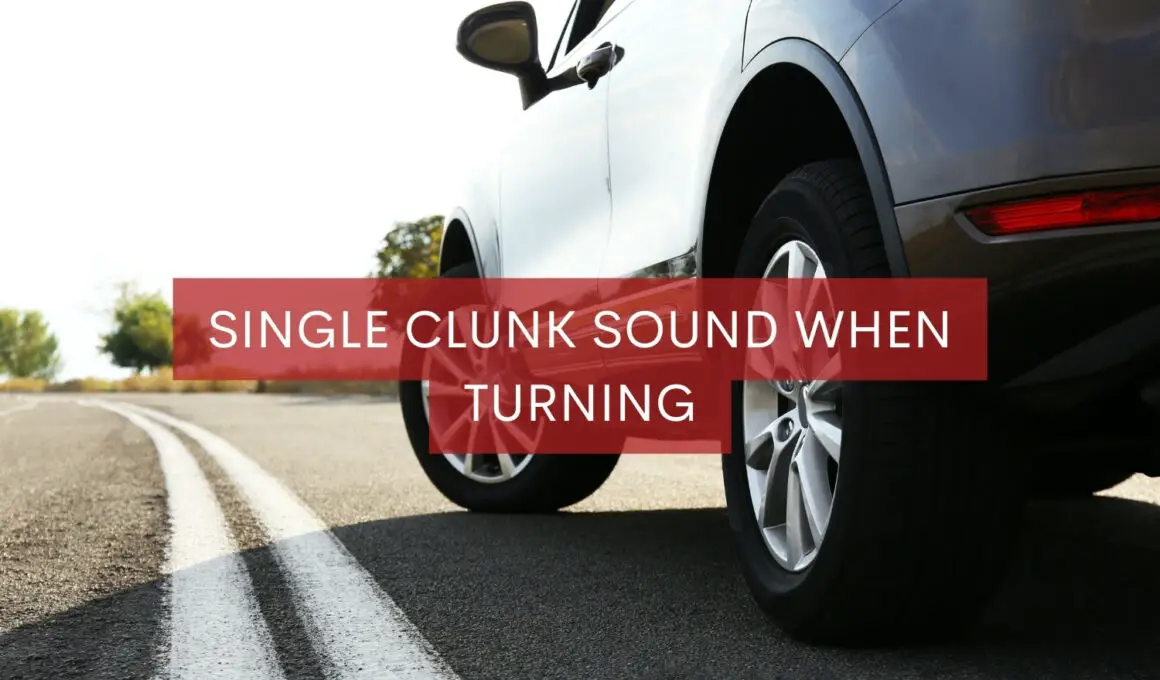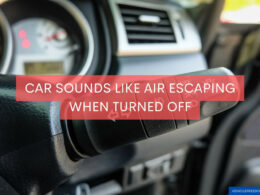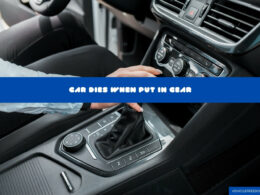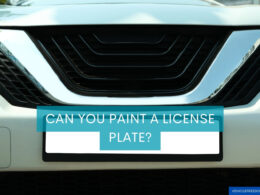In This Article Show
If you’re reading this, it’s likely because you’ve noticed an unusual clunking noise from your vehicle while making turns. While these unanticipated sounds can be quite disconcerting, understanding them can be the first step to solving the issue.
As a seasoned mechanic with over 13 years of experience in the field, I’ve encountered this peculiar single-clunking sound many times, and I’ve helped countless customers solve this often perplexing problem.
Over the years, I’ve also found that translating mechanical jargon into simple, everyday language goes a long way in helping car owners become more familiar with the nuances of their vehicles.
This blog post’ll look into the common causes of this noise and explain how to identify its source. Moreover, we will discuss some effective fixes you can undertake to resolve the problem and preventive measures to help keep your car in excellent running condition.
Common Causes of a Single Clunk When Turning
When you notice a distinct ‘clunk’ sound while turning your vehicle, it’s not just a random noise. Instead, it is usually an indication of specific issues that require attention. In my 13 years as a mechanic, I’ve found that the following are the most common causes:
1. CV Joints Damage
The Constant Velocity (CV) joints are critical to your vehicle’s drivetrain. They transfer the torque from the transmission to the drive wheels at a constant speed while accommodating the up-and-down motion of the suspension.
If the CV joints are damaged or worn out, you might hear a clunking sound when turning. This usually occurs when the protective CV boot gets damaged and grease escapes, leading to wear and tear on the joint.
2. Worn Out Ball Joints
Ball joints are pivot points that link the suspension system and the wheels. They enable your car to handle the road’s bumps while allowing it to steer smoothly. These joints may wear out over time and with continuous use, causing a clunky noise when you turn your vehicle.
3. Strut Mounts Problems
Strut mounts or strut bearings act like a cushion between the strut and your vehicle’s body. They assist in smooth steering and help absorb shocks from road bumps. If these mounts become damaged or worn out, they can create a clunking noise while turning the steering wheel.

4. Sway Bar End Links
The sway bar or stabilizer bar helps your vehicle stay stable while taking turns, preventing excessive body roll. The sway bar end links connect the sway bar to the suspension components. If these links are broken or worn out, they may produce a single clunking sound when turning.
5. Steering Rack End Issues
The steering rack is a crucial part of your vehicle’s steering system. It helps transfer the movement of your steering wheel to the car’s wheels. If the ends of the steering rack are damaged or loose, they can cause a clunking sound when you turn your vehicle.
How to Identify the Source of the Clunk
Diagnosing the source of the clunk sound when turning your vehicle might seem daunting, but it’s not as complicated as it may seem. Here are some methods to help you pin down the issue:
1. Visual Inspection
Sometimes, the problem can be identified through a straightforward visual inspection. For instance, upon inspection, a torn CV boot, a loose sway bar link, or visibly worn ball joints might be evident. Make sure to check these parts for any noticeable signs of damage or wear.
2. Sound Source Analysis
Paying close attention to when and how the sound occurs can also provide clues. For example, if the clunking sound happens when you drive over a bump or dip in the road, it might indicate a problem with the strut mounts or ball joints. The issue may lie within the CV joints or steering rack ends if the noise only occurs when turning.
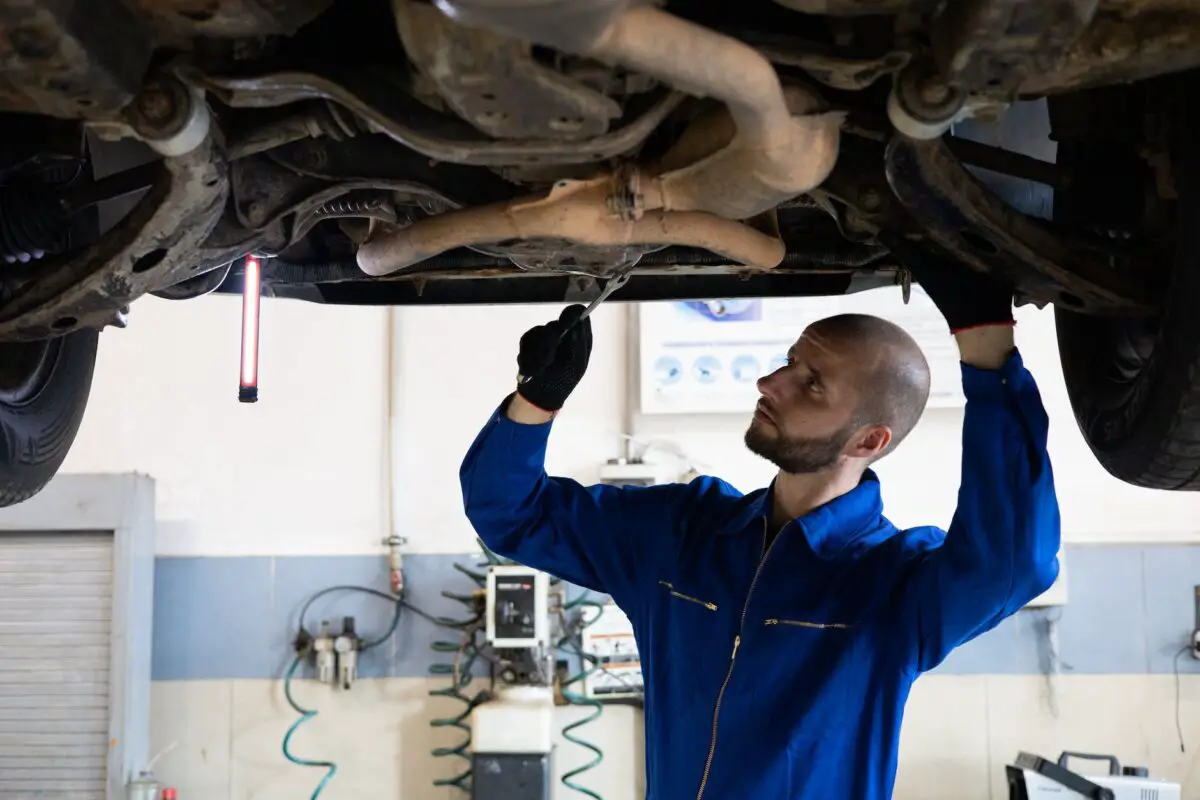
3. Professional Diagnostics
While a keen eye and attentive ear can often diagnose the source of the clunk, some issues may be more elusive and require professional diagnostic tools. For example, a mechanic might use a stethoscope to isolate the sound’s location or a diagnostic scanner to check for any related trouble codes.
Remember, correctly identifying the problem is the first step towards an effective solution. Once you’ve determined the source of the clunk, you’re well on your way to fixing it.
How to Fix a Single Clunk When Turning
Once you’ve identified the source of the issue, you can start to address it. Here’s how you can fix these common problems:
1. Repairing or Replacing CV Joints
If the problem lies in the CV joints, the first step is to check the CV boot. If the boot is torn but the joint is still in good shape, you might be able to get away with replacing just the boot and regreasing the joint. However, if the joint is worn out or damaged, it will need to be replaced. This is a complex task and might require professional assistance.
2. Addressing Worn Out Ball Joints
For worn-out ball joints, replacement is typically the best option. Driving with damaged ball joints can be dangerous, as they can break and lead to loss of control of the vehicle. This is a job that involves specific tools and expertise, and it’s often best left to professionals.
3. Fixing Strut Mounts
Replacement is often the solution if the issue is with the strut mounts. Strut mounts are under constant pressure and wear out over time. While replacing them yourself with the right tools and knowledge is possible, a professional mechanic can ensure it’s done correctly and safely.
4. Repairing Sway Bar End Links
Damaged or worn sway bar end links can also cause a clunking sound. Replacing the links is typically straightforward and can often be done at home with basic tools. However, make sure you’re comfortable with this type of repair before attempting it yourself.
5. Dealing with Steering Rack End Issues
Steering rack ends wear out over time and can cause clunking sounds. Replacement is typically the recommended solution. This is a complex repair that a professional should do to ensure the safety and proper handling of your vehicle.
Remember, while some of these fixes can be done at home, others require professional assistance. It’s crucial to know your limits and seek help when needed to ensure the safety and longevity of your vehicle.
Preventing Future Car Clunks
Preventative measures are always better than reactive ones, especially when it comes to maintaining your vehicle. Here are some tips to help you avoid hearing the dreaded clunk when turning:
1. Regular Maintenance
Sticking to your car’s scheduled maintenance is crucial. This includes timely oil changes, tire rotations, brake checks, and other routine services. Regular inspections can help identify potential issues before they turn into bigger problems, thus preventing a variety of car noises, including the clunk when turning.
2. Mindful Driving
Your driving habits play a significant role in the longevity of your vehicle’s components. Avoiding harsh turns, driving over speed bumps and potholes with care, and maintaining a moderate speed can reduce wear and tear on your car’s components, including those that could cause clunking sounds when turning.
3. Timely Repairs
If you notice something off with your vehicle, whether it’s a peculiar sound or a change in handling, don’t ignore it. Timely repairs can prevent minor issues from escalating into major, costly repairs.
By following these preventative measures, you can ensure a smoother, safer, and quieter ride. Remember, a well-maintained car is more likely to stay reliable and sound-free.
Wrapping it up
In essence, a single clunk when turning is more than just an irritating noise; it’s your car’s way of signaling that something might be wrong. By understanding the potential causes, being diligent with your vehicle’s maintenance, and addressing any issues promptly, you can keep your car running smoothly and quietly.
Remember, while some fixes might be within your abilities, don’t hesitate to seek professional help when needed. After all, the safety and reliability of your vehicle are paramount.






